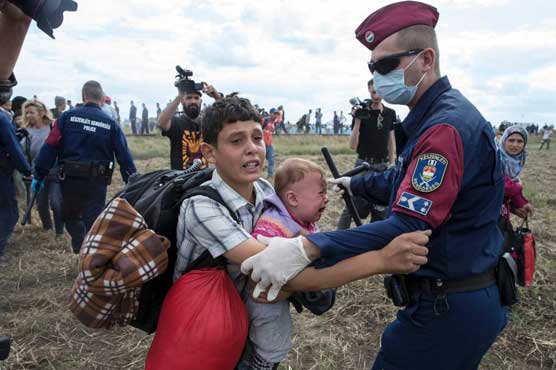Europe's migrant crisis in the UN spotlight

UN chief opened UN General Assembly in New York this week with a call to Europe "to do more"
UNITED NATIONS (AFP) - Europe s migrant crisis took center stage at the United Nations on Wednesday with Secretary General Ban Ki-moon seeking to muster a global response to the worst refugee crisis since World War II.
Leaders from some 70 nations prepared to meet as Greek authorities recovered the bodies of a migrant woman and a child who drowned when their dinghy capsized in the Aegean, the latest reminder of the tragedy.
The UN chief opened the UN General Assembly in New York this week with a call to Europe "to do more" amid sharp divisions between the continent s leaders on how to respond to the migrant flow.
"We should not be building fences or walls, but above all we must look at root causes, in countries of origin," said Ban.
Europe s handling of the crisis has come into focus amid an intense diplomatic debate over the way forward to end the four-year war in Syria, which has driven four million people from their homes.
Turkey s Prime Minister Ahmet Davutoglu took to the podium of the General Assembly to press demands for a "safe zone" to be created in Syria to protect civilians fleeing barrel bombs and the Islamic State group.
Sheltering two million Syrian refugees, Turkey has proposed creating the protected area near the Turkish-Syrian border as a way to cope with the mass influx of refugees from the war-torn country.
Initial reaction to the proposal was cool, but with refugees massing at European borders and thousands of migrants drowning in the Mediterranean, Turkey s plan could gain traction.
In his address, Davutoglu said the United Nations had "failed" to save lives in Syria and stressed that Turkey had "assumed more than its fair share of the burden" from the refugee crisis.
"Our doors will remain open," the prime minister declared, though warning that the refugee crisis will not end before a "legitimate government" is formed in Syria.
- More border checks -
Among the hardest-hit countries in Europe, Germany announced that a record number of between 270,000 to 280,000 refugees had arrived in September, more than the total for all of 2014.
Germany said it could step up checks on asylum claims as migrants arrive at its land borders, while the Czech Republic held police drills on its border with Austria as it mulled re-introducing border controls.
The huge influx, Europe s biggest since World War II, has exposed deep rifts in the continent about where the newcomers should go and what should be done to stem the flow.
A particular source of EU friction is Hungary, which lies at the end of this Balkans route.
It has sealed its border with Serbia and is threatening to follow suit with Croatia, currently the main crossing point.
On the eve of Wednesday s talks, Hungary s foreign minister urged the United Nations to set global quotas on accepting migrants, saying it was unfair for Europe to take so many.
"We suggest that all major players should bear some burden. We should introduce some world quotas," Peter Szijjarto told reporters.
More than 6,600 people entered Hungary on Tuesday, mostly from Croatia, police said.
Buses were taking them onwards to the Austrian border, while workers were constructing two new "transit zones", AFP reporters said.
Reflecting the scale of the problem, the G7 group of leading economies and Gulf states pledged $1.8 billion in funding Tuesday for UN aid agencies helping Syrian refugees, while Japan committed $1.5 billion.
According to the latest figures from the UN refugee agency (UNHCR), Syrians made up 55 percent of the 521,000 migrants who have crossed the Mediterranean bound for Europe this year to date.
Many others came from Afghanistan, Iraq and other hotspots. Nearly 3,000 died or went missing trying in the often treacherous crossing.
An Eritrean man was also killed by a train near the entrance to the Channel Tunnel in France near Calais -- where some 3,000 migrants are camped -- earlier, the 13th such death there since June.
Countries need to "come to an understanding that migration is a mega-trend of our century and depoliticize it," William Swing, the head of the International Organization for Migration, told AFP.


